Widgetized Section
Go to Admin » Appearance » Widgets » and move Gabfire Widget: Social into that MastheadOverlay zone
Introducing The New Ruger MarkIV
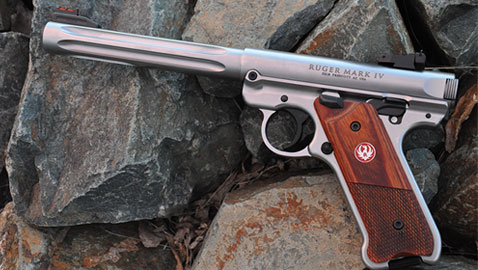 Because I’m a caring, appreciative and loving guy the first gift I presented my future wife was a Ruger MKII pistol purchased at her father’s gun shop. You can understand how I was hooked – a blonde with a gun store made for a powerful attraction. Over the years the Ruger Standard auto has gone through many variations and models including the current MKIII and 22/45 variations. One thing all these pistols have in common, from 1949 to today, is the method of fieldstripping and disassembly via a mainspring housing and latch located in the rear of the frame. While not a difficult process, takedown of the Ruger .22 auto pistols has been a source of frustration to owners and has probably resulted in a reluctance to clean the pistols. Speaking for myself, I usually end up having to look at the manual or one of the videos on Ruger’s website to figure it out.
Because I’m a caring, appreciative and loving guy the first gift I presented my future wife was a Ruger MKII pistol purchased at her father’s gun shop. You can understand how I was hooked – a blonde with a gun store made for a powerful attraction. Over the years the Ruger Standard auto has gone through many variations and models including the current MKIII and 22/45 variations. One thing all these pistols have in common, from 1949 to today, is the method of fieldstripping and disassembly via a mainspring housing and latch located in the rear of the frame. While not a difficult process, takedown of the Ruger .22 auto pistols has been a source of frustration to owners and has probably resulted in a reluctance to clean the pistols. Speaking for myself, I usually end up having to look at the manual or one of the videos on Ruger’s website to figure it out.
The good news is, with the introduction of the Ruger MKIV pistol, takedown and re-assembly is so easy anyone, even me, can remember how to do it. The process is simple and can be accomplished in less time than it takes to read this:
Unload the pistol by removing the magazine, pulling back on the bolt and inspecting the chamber. Put the safety on (up). Grasp the barrel with one hand and the grip with the other, press the button on the back of the pistol with your thumb and tilt the barrel up and off the frame. The bolt is removed by lifting it from the back of the receiver.
Folks, if this isn’t revolutionary it is certainly evolutionary and something everyone who owns an older model of this pistol will appreciate. Over time, various models of the MKIV will replace the MKIII pistols in the Ruger lineup, with the Hunter and Target models being the first to be introduced.
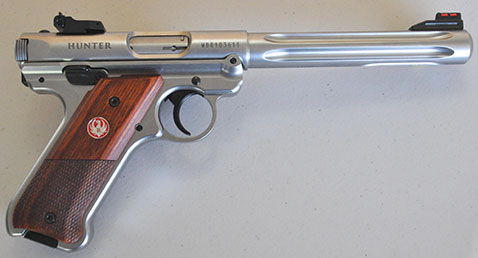 The MKIV pistol I have at hand is a Hunter model that looks almost the same as the current MKIII Hunter yet has been completely re-engineered. Rather than a two-piece frame, the new pistol has a one-piece frame cut from a single piece of steel that allows for tighter tolerances and a better fit of the all-new internal parts. The 6.88 inch fluted barrel is mounted in a new upper receiver designed around the takedown and locking mechanism and
The MKIV pistol I have at hand is a Hunter model that looks almost the same as the current MKIII Hunter yet has been completely re-engineered. Rather than a two-piece frame, the new pistol has a one-piece frame cut from a single piece of steel that allows for tighter tolerances and a better fit of the all-new internal parts. The 6.88 inch fluted barrel is mounted in a new upper receiver designed around the takedown and locking mechanism and 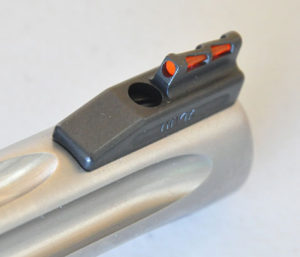 features the same adjustable rear sight and fiber optic front sight as the older model pistol. The half-checkered, half-smooth walnut stocks are carried over from the MKIII as well. While older model MKI and MKII magazines will not work in the MKIII, the MKIII and IV use the same 10 round magazines that drop free when released by the side button magazine release. Two magazines are furnished with the pistol. Features missing from the new pistol include the loaded chamber indicator and internal lock Ruger was forced to add to their pistols by regulations in places like California. Considering that new pistols of any kind don’t meet the requirements for legal sale in California at this point I’m glad to see Ruger has removed these unnecessary features. The new pistol has dual thumb safeties and the right side safety lever can be removed if you like.
features the same adjustable rear sight and fiber optic front sight as the older model pistol. The half-checkered, half-smooth walnut stocks are carried over from the MKIII as well. While older model MKI and MKII magazines will not work in the MKIII, the MKIII and IV use the same 10 round magazines that drop free when released by the side button magazine release. Two magazines are furnished with the pistol. Features missing from the new pistol include the loaded chamber indicator and internal lock Ruger was forced to add to their pistols by regulations in places like California. Considering that new pistols of any kind don’t meet the requirements for legal sale in California at this point I’m glad to see Ruger has removed these unnecessary features. The new pistol has dual thumb safeties and the right side safety lever can be removed if you like.
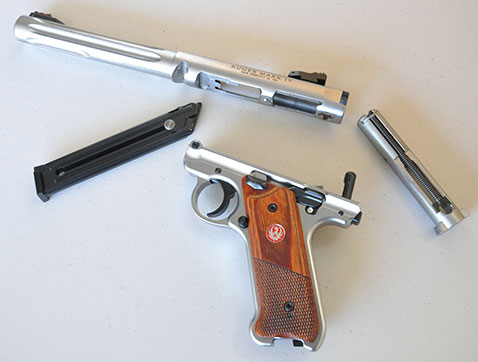 I’m told the specification for the trigger pull of the MKIV is between 4 and 5.5 pounds. Initial testing with the Lyman electronic trigger tester gizmo gave me a very consistent reading averaging 5 pounds. After my range session I re-tested the trigger and it now comes out to an even more consistent 4 pounds, 11 ounces. By consistent, I mean every time, something I rarely encounter when testing triggers. The trigger breaks crisply with no over-travel after a small amount of barely noticeable creep. It’s a very nice trigger. For comparison I took the DG’s (Domestic Goddess) MKII out of the safe and tested it. After firing many thousands of rounds it tests at slightly over 4 pounds and “snaps” a little more crisply than the MKIV trigger. I expect the MKIV trigger will continue to improve over time as well.
I’m told the specification for the trigger pull of the MKIV is between 4 and 5.5 pounds. Initial testing with the Lyman electronic trigger tester gizmo gave me a very consistent reading averaging 5 pounds. After my range session I re-tested the trigger and it now comes out to an even more consistent 4 pounds, 11 ounces. By consistent, I mean every time, something I rarely encounter when testing triggers. The trigger breaks crisply with no over-travel after a small amount of barely noticeable creep. It’s a very nice trigger. For comparison I took the DG’s (Domestic Goddess) MKII out of the safe and tested it. After firing many thousands of rounds it tests at slightly over 4 pounds and “snaps” a little more crisply than the MKIV trigger. I expect the MKIV trigger will continue to improve over time as well.
My first range session was squeezed in between thunder storms and, as is usually the case when I’m testing a 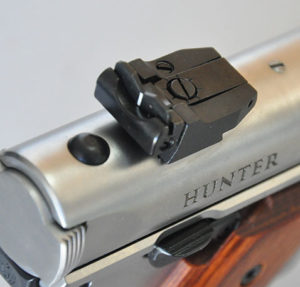 Ruger pistol with adjustable sights I neglected to take a screw driver with me that fits the tiny, narrow slot windage screw. This, despite my range truck carrying anything you might need while shooting, including dozens of screwdrivers and bits. Attempting to use a multi-tool screwdriver, or a blade that doesn’t fit correctly inevitably ends up scratching the sight or mangling the screw, so for once in my life I resisted the urge to improvise, packed up and went home. It was raining anyway. At my workbench I went through the multitude of screwdrivers and bits I have from Brownells and came up with a list of the bits you need to adjust the sights, remove the stocks and remove the screws in the top of the receiver should you wish to install the included sight rail. I ordered a new set of these, along with a hollow-handle bit driver, and plan to keep this “Ruger range kit” in my truck from now on. If you’re interested in doing the same, here are the part numbers:
Ruger pistol with adjustable sights I neglected to take a screw driver with me that fits the tiny, narrow slot windage screw. This, despite my range truck carrying anything you might need while shooting, including dozens of screwdrivers and bits. Attempting to use a multi-tool screwdriver, or a blade that doesn’t fit correctly inevitably ends up scratching the sight or mangling the screw, so for once in my life I resisted the urge to improvise, packed up and went home. It was raining anyway. At my workbench I went through the multitude of screwdrivers and bits I have from Brownells and came up with a list of the bits you need to adjust the sights, remove the stocks and remove the screws in the top of the receiver should you wish to install the included sight rail. I ordered a new set of these, along with a hollow-handle bit driver, and plan to keep this “Ruger range kit” in my truck from now on. If you’re interested in doing the same, here are the part numbers:
185-1, this 3/32 allen wrench bit fits the stock screws, Brownells part #080-185-100
120-1, the tiny, narrow slot bit needed for the windage screw, #080-120-120
210-1, the narrow slot bit for the elevation screw, #080-210-120
120-2, the narrow slot bit that fits the mount screws atop the receiver, #080-120-225
The hollow handled bit driver to store the bits, #080-088-006
How does the MKIV shoot? Exactly as you would expect, it is entirely reliable and superbly accurate. We’ll get into this in more detail later, as I plan to mount an optic on the pistol and see what I can do with it. Lastly, I want to tell you this is a beautiful pistol. The fit and finish is outstanding and Ruger has instituted a new process of deeply laser engraving and polishing the lettering that really makes it stand out. When you open the box for the first time you’re going to say, “Wow”, like I did when I first laid eyes on the young lady who became my wife.
For more information:
www.ruger.com
www.brownells.com
About the Author:
 Ed Head is a regular on Shooting Gallery, Gun Stories and Down Range TV. He has worked for almost 30 years in law enforcement, first in the United States Air Force and then with the United States Border Patrol, retiring as a Field Operations Supervisor. During his Border Patrol career, Ed worked in a variety of patrol, investigative and training capacities. Ed has an extensive background as a firearms instructor, having trained thousands, ranging from beginners to police, military and special operations personnel. Having taught at Gunsite for 20 years, Ed first trained there under the world famous shooting school’s founder, Jeff Cooper, then later ran the school as the operations manager for more than five years. Ed lives in Chino Valley, Arizona, where he continues to teach and write.
Ed Head is a regular on Shooting Gallery, Gun Stories and Down Range TV. He has worked for almost 30 years in law enforcement, first in the United States Air Force and then with the United States Border Patrol, retiring as a Field Operations Supervisor. During his Border Patrol career, Ed worked in a variety of patrol, investigative and training capacities. Ed has an extensive background as a firearms instructor, having trained thousands, ranging from beginners to police, military and special operations personnel. Having taught at Gunsite for 20 years, Ed first trained there under the world famous shooting school’s founder, Jeff Cooper, then later ran the school as the operations manager for more than five years. Ed lives in Chino Valley, Arizona, where he continues to teach and write.

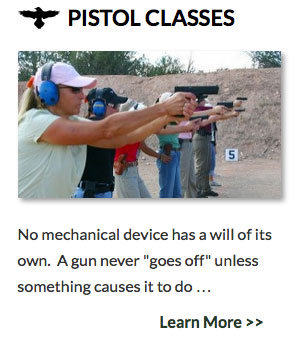

 MidwayUSA
MidwayUSA Ruger Firearms
Ruger Firearms SCCY Firearms
SCCY Firearms Streamlight
Streamlight Action Targets
Action Targets Gunsite Academy
Gunsite Academy
4 Responses to Introducing The New Ruger MarkIV
You must be logged in to post a comment Login